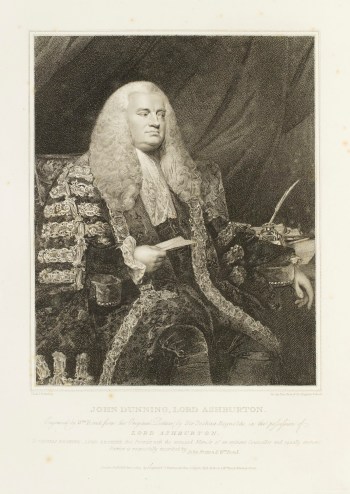John Dunning, 1st Baron Ashburton (1731 - 1783)
John Dunning, 1st Baron Ashburton (1731 - 1783)
RA Collection: People and Organisations
RA Collections decolonial research: Reynolds’ sitters
John Dunning, Lord Ashburton, was a well-known lawyer and politician, who wrote a notice defending the British East India Company in 1762: A Defence of the United Company of Merchants of England trading to the East Indies and their servants (particularly those of Bengal) against the Complaints of the Dutch East India Company; being a Memorial from the English East India Company to his Majesty on that subject .
In the 18th century, the English East India Company transformed into a sovereign state, following a period of turmoil and wars that resulted in British control over Indian territories. In his defence of the company, Dunning discussed the young Nawab of Bengal, Siraj ud-Daulah(1733-1757), describing him as a violent and unjust tyrant, ‘the oppressor’ of the English. He accused the Dutch and other European traders of assisting the Nawab in his attack on the British. Throughout the document, he addresses the various complaints and quarrels between the Dutch and the EEIC, all of which were carried out on Indian soil and used the Nawab as a pawn in their conflicts.
Dunning was elected MP for Calne, Wiltshire in 1768 representing the Whig party and he became known for his speeches which were often critical of the British government, especially concerning its approach to the American colonies. In the high-profile Somerset v Stewart case of 1772, however, he was one of the defence lawyers arguing that enslavement was legally valid in England. James Somerset, an enslaved West African, had been brought to England from America by Charles Stewart, a merchant. Somerset left Stewart’s household in 1771 and refused to return, leading Stewart to have him kidnapped with the intention of selling him on to a plantation owner in Jamaica. Somerset won the case in a landmark ruling that paved the way for the abolition of slavery in Britain.
Profile
Born: 18 October 1731
Died: 18 August 1783
Gender: Male
